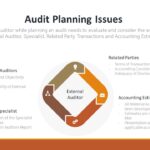Components of Internal Control
Three Objectives of Internal Control are: Operations —- Effectiveness and efficiency of operations Reporting — Reliability of financial reporting Compliance — Compliance with applicable laws and regulations 5 Components of Internal Control are: Internal controls stop CRIME Control activities Policies and procedures Risk assessment process Identification and analysis of relevant risks Information system Information systems […]
Continue reading→Audit – Strategic Planning Issues
Documentation of Audit Plans include: The overall audit strategy (basis of the audit plan) Procedures to be performed Risk assessment procedures Further procedures Other procedures Involvement of specialists Three aspects of audit procedures should be documented in audit plans are: NET of procedures N = Nature E = Extent T = Timing Factors external auditors […]
Continue reading→Audit Planning and Risk Assessment
[A] Pre-Engagement Acceptance Responsibilities 1) Preconditions for an Audit – Auditor to determine that management uses Acceptable financial reporting framework Understands its responsibility for the preparation and fair presentation of financial statements Understands its responsibility for the design, implementation and maintenance of internal control and Understands its responsibility to provide access to all information 2) […]
Continue reading→Professional Responsibilities
AICPA Code of Professional Conduct has a set of specific mandatory rules describing minimum levels of conduct a member must maintain as a CPA Profession has a responsibility to the public. AICPA Code of Professional Conduct expects the CPA to honour public trust Rules that are mandatory for all members are : (a) Integrity and […]
Continue reading→Engagement Responsibilities
Audit Engagements Purpose of Audit is to provide users of financial with an opinion on whether the financial statements are presented fairly, in all material respects in accordance with the applicable financial reporting framework Objective of Audit is to (1) Obtain reasonable assurance (2) Express an Opinion (3) Report findings as required by GAAS (4) Be Independent and comply with relevant ethical rules Auditor to (1) Exercise professional judgement (2) With Professional Skepticism (3) Recognize that circumstances may […]
Continue reading→Covid 19 – Statutory & Regulatory Compliances
Following are several important relief measures taken by the Government of India in view of COVID-19 outbreak, especially on statutory and regulatory compliance matters related to several sectors:— A. INCOME TAX [1] Income Tax Extend last date for income tax returns for (FY 18-19) from 31st March, 2020 to 30th June, 2020. [2] Aadhaar-PAN linking […]
Continue reading→Corporate Social Responsibility (CSR) – Activities, Reporting & Accounting
CSR CONCEPTS Corporate Responsibility is the continuing commitment by business to behave ethically and a positive continuity towards social and economic development at large. It is the contribution of the corporate sector for philanthropic causes like education, health, water, environment and community welfare. Corporate responsibility evokes from good governance. Good Governance covers moral values, powers, […]
Continue reading→Basic Concepts of International Taxation
Going global is impressive, yet is much more complex than meets the eye. To successfully convert a domestic business to an international one, a host of factors needs to be considered. Further, on one side the advent of internet has been a key business enabler and a leveler for SMEs, on the other side it […]
Continue reading→EVC for electronically verifying Income-tax return
Notification No. 2/2015 EVC to verify Income-tax return As per the above-referred notification, Electronic Verification Code (EVC) is a 10-digit alpha numeric code generated for the purpose of electronic verification of the person furnishing the return of income. The same is not applicable to assesse’s where a digital signature is mandatory i.e. a company assessee, […]
Continue reading→Relevant TDS Amendments in Union Budget 2015
Sr. Sec Main Heading Amendment Action Points ‘ ‘ ‘ ‘ ‘ ‘ 1 192 Tax deduction from Salary Employer shall obtain from employee, the proofs of claims (incl. set-off of house property loss) made by him in the prescribed form and manner from 01/06/2015. Prescribed Form has not yet been notified. […]
Continue reading→







